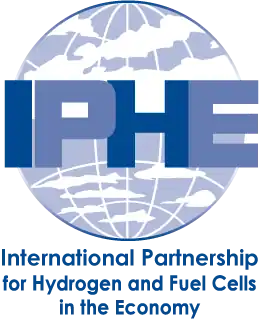International Partnership for Hydrogen and Fuel Cells in the Economy
The International Partnership for Hydrogen and Fuel Cells in the Economy (IPHE) is an international collaborative initiative for the development and deployment of hydrogen and fuel cell technologies and to enable global energy security, environmental and economic benefits that these technologies can provide. The IPHE membership is open to national governmental entities that have significant commitments to invest resources into research, development and demonstration activities to advance hydrogen and fuel cell technologies.[1]

Background
The IPHE Terms of Reference that was signed in November 2003 created a steering committee which governs over the overall framework and activities of the IPHE. The mission of the IPHE is to serve as a mechanism to share information among partners to enable the organization and implementation of international research, development, demonstration and deployment activities that are related to hydrogen and fuel cell technologies. The organization also provides a forum for sharing information on new policies as well as common codes and standards that are built for the transition to hydrogen and fuel cells in a global economy for energy security and environmental protection.
The four strategic priorities which guide the activities of the organization include:
- Accelerating the market penetration and early adoption of hydrogen and fuel cell technologies and their supporting infrastructure
- Supporting widespread deployment through policy and regulatory activities
- Raising the profile with policy-makers and the public
- Monitoring hydrogen, fuel cell and complementary technology developments
The two primary Working Groups within IPHE are the Education Working Group and the Regulations, Codes and Standards (RCS) Working Group.[2] The Education Working Group focuses on sharing practices and ideas on methods to increase education and outreach activities, including recognition programs such as through student awards.
The RCS Working Group has focused on a number of activities related to sharing information on safety and protocol development related to testing hydrogen systems, including round robin testing of hydrogen tanks among several countries. Task Forces are also created to accelerate activities in specific areas as needed, such as the Task Force on sharing information on policies and incentives that may allow for the commercialization of hydrogen and fuel cell technologies.
IPHE organises a number of workshops and events for stakeholders that are aligned with its mission.[3]
In July 2005, the G8 Summit endorsed the IPHE in its Plan of Action on Climate Change, Clean Energy and Sustainable Development, and identified it as a medium of cooperation and collaboration to develop clean energy technologies.[4]
Similar designations were also made in bilateral activities that include:
- the joint statement of the U.S.-European Union Summit on Energy Security, Energy Efficiency, Renewables and Economic Development,[5] and
- the Mainz Declaration of Germany and the United States on Cleaner and More Efficient Energy, Development and Climate Change.[6]
Note: When formed in 2003, the IPHE stood for the "International Partnership for the Hydrogen Economy". The name was changed in 2009 in order to ensure the inclusion of fuel cell technologies within the scope of the partnership.
References
- "Early Career Chapter". iphe. Retrieved 2020-10-28.
- "Working Groups and Task Forces". iphe. Retrieved 2020-10-28.
- "Forums & Workshops". iphe. Retrieved 2020-10-28.
- Gleneagles Plan of Action: Climate Change, Clean Energy and Sustainable Development"
- U.S.-European Union Summit on Energy Security, Energy Efficiency, Renewables and Economic Development"
- Mainz Declaration" Archived 2008-11-28 at the Wayback Machine